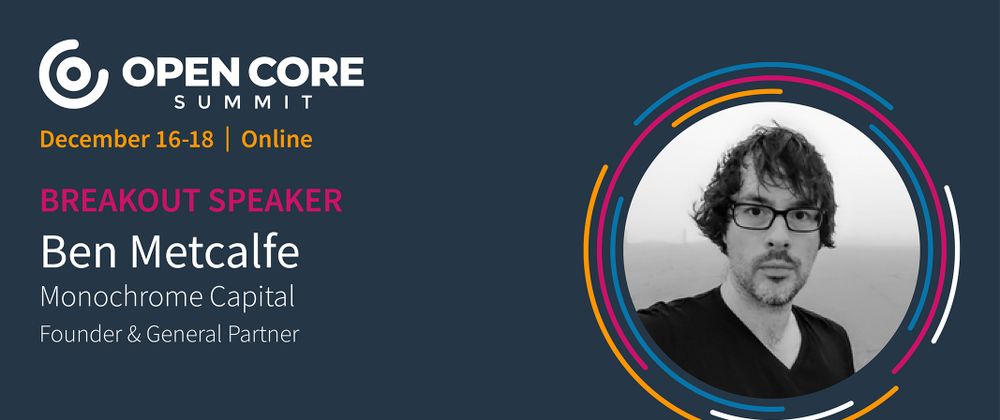Ben Metcalfe invests in early-stage software and AI-driven startups that are solving the toughest business challenges. He is a co-founder of WP Engine and has previously held product and engineering leadership roles at Uber, BBC, and MySpace. But above all, he is passionate about helping founders find success and help them grow into business leaders.
Relevant Links
LinkedIn - Twitter
Co-founder of WPEngine, Ben Metcalfe, and new founder/GP of Monochrome Capital on the origins of WPEngine, one of the leading COSS WordPress
How did you get to know open-source, and what got you to form WPEngine? — 0:00
Ben describes programming on BASIC at 8 years old, picking up C/C++ at 12, and distributing freeware in the schoolyard with friends in the early 90s.
Was excited by the idea of “trading software.”
“Open source has always been at the heart of the tools that I’ve used.”
Through business career as developer, product manager, and running a VC fund, Ben remains excited about open-source.
WPEngine is one of the few large, successful companies in the WordPress ecosystem. How did you get conviction around starting WPEngine, and could you share the origin story around the company and the early vision? — 1:52
Ben speaks about starting career with BBC channel as a CMS operating engineer, and general interests in content and content management.
At home, was building websites with B2, until WordPress came around.
Moved to US in 2006, met Matt Mullenweg and lived in the same building. At same time, Ben’s girlfriend was running a blog with six figures in revenue, but lots of security issues and frequently got hacked. Also, Heroku had just come out. So Ben wanted to create a Heroku for WordPress - which led him to Jason Cohen.
Early on how did you think about governance, and contributions to WordPress? — 4:55
Ben speaks about forking in the context of governance. Praises Matt for forking WordPress out of B2.
“To be candid, we did not contribute a whole lot in the early days. Like any startup, we were just barely keeping the lights on and trying to make a salary.”
As WPEngine grew, Ben describes their desire in contributing on the community side. WPEngine would attend, underwrite, and sponsor a lot of WordCamp events. Not just in SF/NY, but all over the country. “The idea was, you spread the knowledge out.”
Ben speaks about the WordPress ecosystem being distributed, in part due to Automattic building a distributed company.
Let’s dig into the business model. How did you first start to charge money for something? What was the first product idea, what were you charging money for, how did you first access customers? How did business model evolve over the first four years? — 7:29
Ben speaks about the importance of getting LOIs from WordPress site owners, in which site owners agreed to pay $50/month if WPEngine could provide specified features (e.g. hosting, security).
Company collected a number of LOIs like that, and recognized there was demand. Company built those features and went back to those customers. “Those were the anchor customers that got the company going.”
In first full year of operation, reached $1 million in revenue. “It scaled very quickly. Self-service to begin with. … This was a frictionless way to begin the business. Once you knew the demand was there, and once everything was built, you could just open the floodgates, and there was no friction from signing people up. We didn’t want to do anything manual that we didn’t have to, so you could just get people logging on.”
Ben highlights an inflection point: seeing fortune 500 and global 2000 companies signing up for the service, recognizing those customers, and offering an enterprise package -- figuring out the additional features, support, and quality that would make a higher price point valuable to enterprise, and then building that, followed by creating an enterprise sales team and enterprise support team.
Current WPEngine is from about $30/month, all the way up to a few hundred thousand dollars per year for a large enterprise account.
I want to dig more into the per-site business model. If it’s a larger customer, how do you upsell them? Is it subdomains, seperate sites, geographic breakdown? How do you get a six-figure, seven-figure deal for hosting websites? What does that include and what kind of richness of product? — 11:27
Ben highlights the importance of aligning with the value of the customer — in particular, including the costs of your business in providing value.
Ben describes the various pricing tiers of self-service. The way you’d increase tiers for an SMB is either based on (a) adding more sites or (b) having more traffic. For an SMB, those are the two main sources of value.
Ben also highlights a staging area, where you could experiment with changes and then push them to production, as well as a Git integration.
The enterprise buyer is different. They wanted to run on bare metal, and they wanted a greater level of technical support. Ben also describes the value of soft features and how to include them.
I want to ask about the relationship between WPEngine and Automattic. How did that relationship look like in the market, in terms of collaboration, competition, and how has it evolved? — 16:35
“When we went to raise capital, Matt put some money in, so we’re grateful for Matt’s support early on.”
When WPEngine was founded, Automattic was very focused on the free and $10/month accounts. Essentially an average revenue per user (RPU) of about $10/year.
There was a middle distribution of businesses and people who wanted to pay to use WordPress, who wanted their own themes and own plugins.
Then there was also a VIP tier with Automattic, which had good quality, but somewhat restrictive in company access and was expensive.
WPEngine identified a large middle gap which Automattic wasn’t interested in or going after. “If WordPress was democratization of publishing, we wanted to fulfill that promise to the rest of the middle.”
So it wasn’t competitive, as the companies were in different parts of the market, and Ben is grateful for Automattic’s support in the early days.
(JJ shares thoughts on positive sum dynamics compared to zero-sum, and relates it to the context of WPEngine and Automattic and their success in the same ecosystem) — 19:13
“I think that’s quite right.”
Ben shares his view as a VC. “You shouldn’t be in markets that are zero-sum games.”
Talks about the broad space and huge TAM of ecosystems like WordPress.
“The open-source community can disrupt you if you’re only thinking in a zero-sum way.”
Also, as VC, Ben identifies interest in fueling innovation that benefits everyone. “By being part of open-source, you enable far greater impact with the work that you’re doing.” Relates how this enables open-source companies to get top talent, and build better companies, which creates a virtous circle.
You’re a VC now. Tell us about Monochrome, and tell us about your first investment in a company called Sanity. — 23:20
Ben has been a VC for 3+ years now. Decided he wanted to launch his own boutique VC firm, focusing on companies that are software/AI heavy, which are solving a difficult business challenge with a degree of software/AI which forms a competitive moat.
Offers a Snowflake/JFrog anecdote. To invest in those companies early on, you have to have VC skills and software experience, to understand the companies and to be able to help the founders. That is where Ben wants to be, with a focus on B2B companies.
If you could reflect on your founder experience at WPEngine and now founding antoher venture with Monochrome, how would you change what you knew going into starting something? If you could know something that you didn’t know, what would you desire to know?— 25:37
“I think to have more confidence in myself, and in the community around you.”
Ben’s criticism for himself is that he was waiting until he thought everything was safe and would be successful, before taking a leap. “Sometimes you just have to take a leap and try it, and that really is the spirit of entrepreneurism.”
“Embrace the chaos, embrace the universe. … This is a great time to take risks, especially if they are the right risks.”
Share your questions and comments below!



Top comments (0)